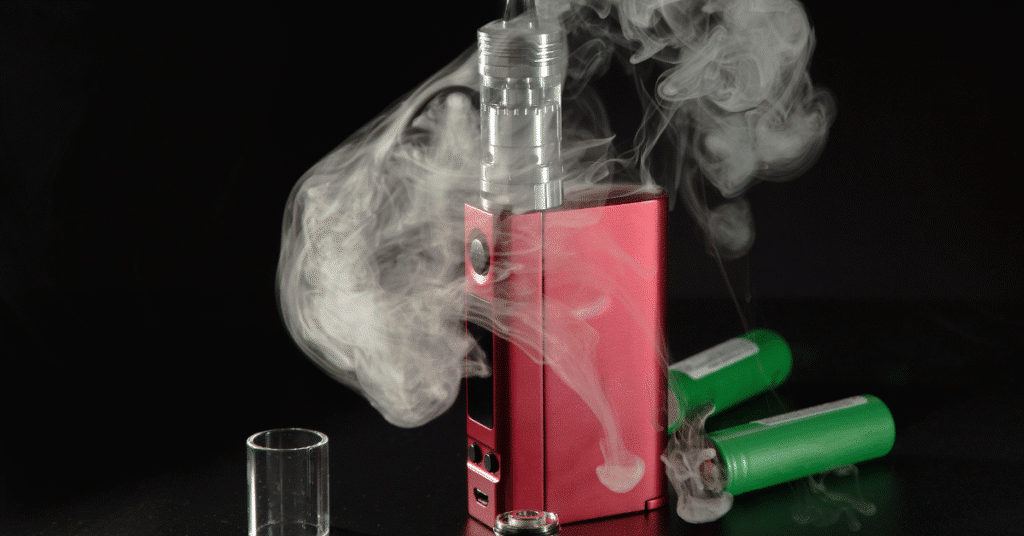Vaping is when you use handheld devices like e-cigarettes or vape pens to inhale the mists of nicotine and other drugs. Vaping is very common among middle and high school students, so as a parent or a loved one, it is natural to want to know more about vaping. A very common question you may have is, “Is vape a drug?” Well, we shall answer all your questions and more in this article, so please read along.
Is Vaping Considered a Drug – or Just a Delivery System?
As per a recent survey by the National Youth Tobacco Survey, more than 2 million middle and high school students engage in vaping. So, what is vaping, and is vaping a drug?
Vaping is when you inhale the mist (aerosol) of an electronic cigarette or e-cigarette. They are also known as e-cigs, e-hookahs, and vape pens. Vapes in themselves are not drugs, but a delivery system. The mist, meanwhile, is not just vapor – it contains nicotine and other chemicals or flavorings like cannabis.
What Is in Vapes?
Are vapes drugs? No, not in themselves. But a typical vape contains nicotine, cannabis, and other harmful chemicals that can be dangerous for you. Here are some of the other chemicals you need to know:
- Acrolein: It is an insect killer that can irritate the lining inside the nose and inflict damage upon the lungs.
- Formaldehyde: Found in products like floor cleaners, which can also damage the lungs and increase the risk of cancer.
- Propylene Glycol: It is a synthetic liquid that can trigger harmful conditions like asthma.
- Heavy Metals: Contain heavy metals like arsenic and nickel that are carcinogenic and can be highly damaging to developing brains (teenage brains, especially).
Do Vapes Get You High? Nicotine and Other Psychoactive Ingredients
Yes, vapes make you high, which is what keeps you going back for more. There is a real potential for misuse. The main reason is nicotine, which is addictive in that it is difficult to stop once you get started. Vaping is less dangerous than smoking, but this does not mean it is harmless. While nicotine can feel pleasant at first, it can increase anxiety and depression, and negatively impact your learning, memory, brain development, and even your heart.
The other infamous vaping product is cannabis- also known as marijuana, weed, pot, and what have you. Once again, vaping weed does make you high, and while it is less harmful than smoking weed, it still has its negative side effects that can affect brain development and other aspects of health, especially when young.
Please keep in mind, it is indeed true that vaping is typically linked with nicotine and marijuana, but this does not mean that devices cannot be misused. They can be used to deliver other hard drugs like crystal methamphetamine (meth), fentanyl, and so on. In fact, there have been reports of widespread adulterated and spiked devices found in illicit markets and even schools! When you are not aware of what you are vaping, it does not just lead to harmful side effects, but even life-threatening overdoses and fatalities.
What Are the Risks of Vaping?
There is a belief that vaping is not as harmful as smoking, or it is not as addictive. In fact, vaping has even been suggested as a smoking cessation tool. However, the reality is far from all this. Vaping leads to a number of health risks and complications, such as:
- Anxiety
- Depressed mood
- Sleep disturbances
- Bronchitis
- Lung damage
- Sexual dysfunction, such as impotence among men
- Addiction and dependence
- Brain damage, especially among teenagers
- Increased risk of cancer.
Smoking vs. Vaping: Is Smoking and Vaping the Same Thing?
Smoking and vaping are often confused and used interchangeably, but they are slightly different. The main difference between smoking and vaping is the method of substance delivery. Smoking involves burning tobacco or other products to produce smoke, while vaping uses electronic devices like e-cigarettes to heat a liquid into aerosol, often containing nicotine, for inhalation.
There are some suggestions that vaping is a less harmful alternative to smoking. But both smoking and vaping have high health risks. While the effects of vaping are not completely understood, it is in no way a safe alternative to smoking.
How Do I Know If My Loved One Is Vaping?
Some of the signs of vaping are:
- Health concerns like coughing and wheezing
- Strange, suspicious smells
- Presence of e-cigarettes, which can look like regular cigarettes, writing pens, highlighters, and even cellphone components.
If you suspect your loved one is vaping, you need to trust your gut. It is very common among adolescents and teenagers, so you need to proceed with caution here. Create an open, non-judgmental environment where you encourage honest and respectful two-way communication. For instance, you can ask your loved one whether they have tried vaping, pose open-ended questions, and try to understand their point of view before you begin to take any action.
How to Quit Vaping?
If you want to quit vaping or help your loved one quit vaping, then here are some steps you can follow:
- Single out one day where you go without vaping. It will be better if you plan it in advance and have your support system around you for the same.
- Remove all vaping supplies and other related paraphernalia.
- Understand withdrawal. For instance, nicotine withdrawal can be very strong, characterized by cravings, anxiety, restlessness, hunger, and sleeping troubles. This can go on for a few days, so prepare for it in advance.
- Eat a balanced diet and keep your body hydrated by drinking plenty of water.
- Whenever you experience cravings, chew gum or lollipops to distract yourself.
Of course, quitting vaping is not always as easy as following a few steps. You need to get to the underlying patterns leading to vapid, for which you will need comprehensive psychotherapy. You will work with licensed and experienced mental health professionals who will utilize techniques like motivational interviewing, cognitive behavioral therapy, contingency management, and 12-Step recovery models. Simultaneously, you can also attend peer support programs like Narcotics Anonymous, Marijuana Anonymous, or other ones like SMART Recovery, and so on.
Break Free from Vaping – Begin Your Recovery Now!
If you find that vaping has become more than just a habit, know that you are not alone; you do not have to face it all by yourself. At Skyline Recovery, we will help you break free from vaping and other substance dependencies with evidence-based care and a personalized approach tailored to your needs and goals. Whether you are worried about your own vaping struggles or a loved one’s, we see you, and we want to hear from you.
Please call us today at (424) 353-5206 to take the first step toward a healthier, vape-free tomorrow.


